There is no one alive who has not felt the vibration of generational trauma within his or her own life. There are many for whom it has been designated a different label, hastily indexed under an alternate category such as awkward behaviour or unfortunate personality trait. As someone who has spent thousands of hours trawling through all manner of symptomatic suffering, with all demographic of people, the connection that our generational ties have to our current lives is undeniable.
When the Black Lives Matter protests began earlier this year, I watched as the people around me, of various ethnicities, steadily took up the cause and let their emotions flow full force. I watched people organise marches, dedicate their entire social media accounts to the movement, share WhatsApp links and synchronise their outrage. People were angry at the death of George Floyd, angry at the injustices that have been allowed to play out for hundreds of years. They were vengeful at the state of the world and eager to act and redress its balance. On almost every level I saw the quest for real equality and freedom projected outward, the desire for justice playing out externally; and on almost every level there was nearly zero reference to the internal work also necessary, for any real change to take root. As metaphors go, this was pretty much akin to pruning a mighty oak, in the hopes that its diseased and thirsty roots might again be made whole.
When defining generational suffering it helps to be specific, so as to understand that we are all afflicted with it to some extent. Generational trauma is an experience of pain or distress passed down through a family lineage. Studies have been conducted on epigenetic trauma, the very real occurrence of a person’s life experience directly contributing to how their DNA responds and, in turn, what the following generation(s) is predisposed to. The affects are not only physical but indeed mental and emotional. If history is not enough of a red flag for this, then science instead confirms the need for at least a pause, when attempting to heal any collective of people. Healing as a unit, with only a perspective of the current moment, is doomed to temporary success at best.
There is a misconception that generational trauma involves a level of dysfunction that is obvious in everyday life, and this in part stems from the word trauma itself. It is a weighty word, it carries with it inferences of deep, tabooed conflict and abuse. It is used in cases where the severity of a situation must be ranked above average and for this reason, people can feel that their experiences do not qualify, or meet the necessary criteria of pain. The truth is, generational trauma, even that which stems from the smallest incident, can be called so because of its accumulated effects, if not for the original incident(s) alone. A tiny snowball is a fairly innocuous threat to a child playing in a below valley. Picture that same mound of ice however, rolling through miles of snow on its way down. Suddenly we see that even an adult in its path must either be helped, or help themselves out of its way.
In its rawest and simplest form, generational trauma resembles your relative having an experience and its impact reverberating through your family lineage. It is being unable to form healthy romantic relationships because your parents could not. It is fearing abandonment because your mother, father, uncle repeatedly was, physically or emotionally. It is never feeling you belong because your (great) grandparents had to escape, or were exiled from their land of birth. It is feeling that life is too much to bear, (without) knowing there is a deep predisposition and history of unexplored or hidden suicides in your family. It is being unable to ask for help because someone in your bloodline was rejected, when they themselves most needed it. Generational trauma looks like your ancestors being enslaved for hundreds of years, and you having an inherent distrust not only for a particular race, but in fact the world.
This type of trauma hides in the shadows because human beings believe there is an inherent uniqueness to the experiences they personally live through. We isolate our pain and our patterns and if healing is sought, it often stops at our own childhood memories, rarely our mother’s, or our mother’s mother. Healing is narrowed to the perspective of our current generation and limited only to this. The truth is, however, we have to go right the way back. All the way back. Not as a society, not as a collective, but personally. The problem with many of the discussions witnessed by myself about race and the next steps for equality and true freedom, was that few took into account this healing of one’s own personal history. Few, in my own circles, were discussing the inadequacy of healing a collective without first addressing it’s individual counterparts. There is a problem between the races, yes, but it is more than skin deep. It is about the bloodlines running through our veins and the unconscious programming all sides are failing to acknowledge.
A large part of my career has been spent working with people to unearth and clear the emotional ties present in their lives. This includes belief systems born from trauma, which hold them hostage to patterns of behaviour and thought, utterly detrimental to living a preferred quality of life. A legacy of pain cannot not be eased only through focusing forwards, unless one has cut those ties within personal history which inform the choices and avenues we take. There are reasons particular groups of people have an aversion to authority or are victimised by it. There are reasons why people with otherwise stellar upbringings are predisposed to have difficult relationships, or why loss, grief or sexual trauma, always feel so close. It also does not help that trauma can and will skip a generation, or appear loaded onto one particular sibling or child. Take another look at that black sheep in your family, the one who doesn’t fit in, who is understood only by the one obscure aunt who rarely sees them. These are the family members possibly carrying burdens that do not make sense, even to themselves, when tackled purely from a logical perspective. On a wider scale, the idea that an entire race can come from an ancestry stripped of its spirituality, its home, its freedom and bear no scars, is not credible. If anything, it is wishful thinking.
The same principle applies and is true not only for those with an ancestry of suffering, but for those known to have inflicted it. Any notion that oppressors will not bear guilt or shame, associated with their ancestors building empires on the bodily fluids of other, unwilling and unrecompensed human beings, is unrealistic.
We are all, it seems, attempting to redecorate the world when in fact it is our own houses which must first be razed to the ground. Freedom, for any of us, is unobtainable lest we trace the chains of suffering and shame back to where they are anchored. It is not enough simply to loosen them, so that they match another who is equally enchained.







